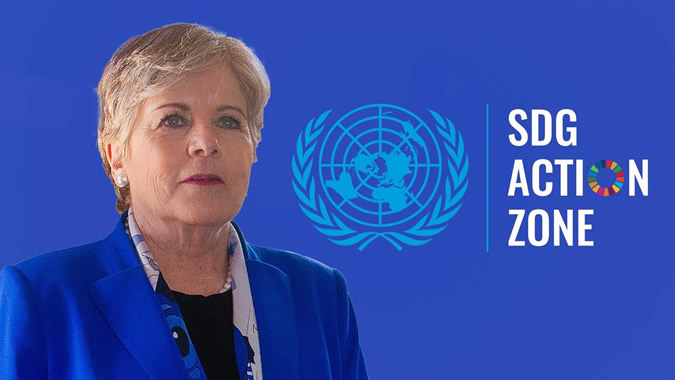Building Latin America and the Caribbean Back Better Post-Pandemic Means Reconfiguring Development with Equality and Sustainability: Alicia Bárcena
In the SDG Action Zone of the 75th UN General Assembly, ECLAC’s Executive Secretary addressed some of the region’s most pressing challenges in times of COVID-19 via video message.

“Inequality defines Latin America and the Caribbean. Wealth, income, social protection, education, knowledge and skills are in the hands of the few,” Alicia Bárcena, Executive Secretary of the Economic Commission for Latin America and the Caribbean (ECLAC), said in a video message transmitted on Tuesday, 22 September 2020, in the SDG Action Zone, a virtual event held in the framework of the 75th session of the United Nations General Assembly.
In this context, “building Latin America and the Caribbean back better post-pandemic means reconfiguring development with equality and sustainability,” Bárcena stressed during this activity in which the Executive Secretaries of the other UN regional commissions (for Africa, Western Asia, Asia Pacific, and Europe) offered their assessments as well. This was followed by a dialogue among diverse representatives of these regions.
As a result of the COVID-19 pandemic, ECLAC estimates a -9.1% contraction in the region’s Gross Domestic Product (GDP), with an increase in poverty that will end up affecting 231 million people (96 million of whom will live in extreme poverty).
“Governments have provided emergency basic income to the poor and tax exemptions and grace periods to micro, small and medium-sized enterprises. ECLAC proposes extending these measures for 9 months,” Bárcena said.
The Commission also proposes a basic digital basket composed of a laptop, smartphone, tablet, and a connectivity plan for households without Internet, the senior official added.
With regard to the state of gender equality in the region, Bárcena indicated that “women are worse off than men in terms of discrimination, political exclusion and lack of economic autonomy.” She also stressed that “violence against women and girls is the tragedy of inequality exacerbated in this pandemic.”
The crisis is affecting women more severely since they represent more than 60% of informal labor, and confinement is placing additional pressure on them as primary caregivers, whether paid or unpaid, she emphasized.
Women are also on the front line of the response to this health crisis and are more exposed to infection, as they account for 72.6% of those employed in the region’s health sector. And although the region has achieved good results in terms of access to education, “there is a need to improve women’s economic autonomy through access to high quality jobs, equal pay and financial inclusion,” she stated.
“We need a new political and fiscal compact to ensure universal social protection,” Alicia Bárcena underscored.
Subsequently, Amr Nour, Director of the UN Regional Commissions’ New York Office, held a live dialogue with Yetnebersh Negussie, Senior Manager of the Global Action on Disability (GLAD); Philipp Schönrock, Director of Cepei, a think tank based in Bogotá, Colombia; Salma Nims, Secretary General of the Jordanian National Commission for Women; Durreen Shahnaz, Founder of Impact Investment Exchange; and Rosalyn Old, Board Member of the European Youth Forum.
Representing Latin America and the Caribbean, Philipp Schönrock said it is necessary to create multi-stakeholder approaches in which distinct representatives contribute their experience. “To address poverty and inequality in Latin America and the Caribbean, civil society can provide better data on impact to all stakeholders involved. We are getting a lot of numbers out here but not a lot that are helping policymakers to make evidence-based decisions,” he stated. When asked about the post-pandemic rebuilding with our sights set on achieving the Sustainable Development Goals (SDGs), Schönrock contended that “we have to build on what already exists. We have multilateral organizations, starting with the United Nations regional commissions, in addition to the funds, agencies and programs” that have a regional presence, and therefore their acquired knowledge should be harnessed, he concluded.
Subregional headquarter(s) and office(s)
Type
Country(ies)
- Latin America and the Caribbean
Contact
Public Information Unit
- prensa@cepal.org
- (56 2) 2210 2040